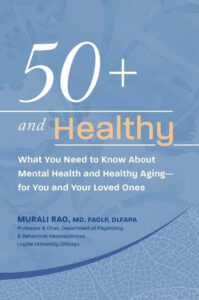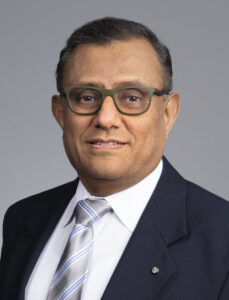What Do We Mean by Healthy Aging? By Dr. Murali Rao, author, 50+ and Healthy (Book Excerpt)
 Chapter 4
Chapter 4
Mental and Emotional Reserves
Research has been undertaken on the existence and the effects of ‘brain reserves’ as well as ‘emotional reserves’ in relation to later-life mental health. The first is still little known, and the starting premise is that — just as some people simply have greater muscular strength throughout their lives than others — brain strength or brain capacity is also different from one person to another. Does this brain reserve help to create or sustain later-life mental health? Stay tuned for more research results. Emotional reserves, like that greater muscular strength, is also a later-life resource to maintain mental health. These reserves are what allow some of us to deal head on with (and fairly quickly resolve and move on from) life’s challenges, troubles, shocks and stresses — while others of us wallow in them, wring our hands, get and stay emotional and reactive for quite a longer time. An ability to self-motivate and take one’s overall health in charge might be part of that emotional reserve, and it goes a long way to maintaining one’s physical, emotional and mental health. This might include self-monitoring, since major depression and dementia evolve slowly, over years and decades. Recognizing a ‘minor’ cognitive decline or ‘mild’ or ‘sporadic’ emotional issues early on can help the individual combat more severe mental disorders very early. (The “nip it in the bud” approach.)
Mental Attitude
Moving to something for which the research has clearer results, we look at the power of being positive. It is fairly easy for us to determine whether another individual has a positive or a negative outlook. Here is where mind meets emotions: We see and feel it!
Characteristics of a cheerful, positive disposition:
- enthusiastic support for others’ endeavors
- expressions of happiness and joy with one’s life
- the ability to make lemonade out of lemons definitely represent a positive outlook
Conversely, negativity arises in the form of:
- expressed or suppressed anger, fear, sadness
- constant complaining or rude gossiping
- jealousy of others’ accomplishments
- a doomsday outlook for one’s future
- a ‘what’s the use?’ outlook
There’s no confusing the two sets of emotions as they are polar opposites. Research and studies have long shown that individuals with largely positive emotions/feelings and optimistic outlooks are more likely to be healthy in all ways than those who hold and express largely pessimistic, negative feelings/ emotions and unhappy views of their lives and their world. The positive individuals tend to cope and adapt quicker and more effectively than the negative ones to challenges, bad news or crises.
Emotions create/support physical health or they create/perpetuate illness.
- feelings such as chronic anger or hostility can increase coronary heart disease risk factors
- anxiety disorder has been associated with greater physical disability and diminished well-being
- depression is connected to a lesser health and lower quality of life, and a greater risk for death from
suicide or medical illness
Emotions are a very real component of our physical, emotional, social, spiritual, mental/cognitive health.
Measuring Cognition
Mental cognition involves other types of functions, which mental health professionals measure:
- Fluid intelligence, as expressed in problem-solving and inductive reasoning (operations independent of
context and content)
- Retentive memory
- Attention, or the time span of attention and focus on a range of things
- Language functions, including finding your words
- Executive functions, which is planning and rapid decision-making ability
- Speed of mental processing
- Social cognition, such as maintaining one or more good relationships
- Expressing sympathy/empathy appropriately
Measuring cognition in the elderly, although it is widely done, is challenging as I have stated. The reason measuring such cognition is challenging is due to the presence of undetected as well as known health conditions (arthritis, dehydration, some types of medication, metabolic conditions, early-stage undiagnosed chronic disease) which can all impact cognition to greater or lesser degrees.
 Dr. Murali Rao is the Professor and Chairman of the Department of Psychiatry and Behavioral Neurosciences at Loyola University Medical Center in Chicago. He specializes in liaison and emergency psychiatry. Additionally, he serves as a member of multiple professional bodies including the American College of Psychiatrists, the Academy of Psychosomatic Medicine, CINP, the Indian Psychiatric Society, and the American College of forensic Psychiatry. Dr. Rao has received multiple awards and fellowships including Distinguished Life Fellow by the APA, Outstanding Academician Award by the Indo-American Psychiatric Association, and the Master Teacher Award by the Stritch School of Medicine. Dr. Rao has also had more than 50 journal publications and is the author of 50+ And Healthy: What You Need to Know About Mental Health and Healthy Aging.
Dr. Murali Rao is the Professor and Chairman of the Department of Psychiatry and Behavioral Neurosciences at Loyola University Medical Center in Chicago. He specializes in liaison and emergency psychiatry. Additionally, he serves as a member of multiple professional bodies including the American College of Psychiatrists, the Academy of Psychosomatic Medicine, CINP, the Indian Psychiatric Society, and the American College of forensic Psychiatry. Dr. Rao has received multiple awards and fellowships including Distinguished Life Fellow by the APA, Outstanding Academician Award by the Indo-American Psychiatric Association, and the Master Teacher Award by the Stritch School of Medicine. Dr. Rao has also had more than 50 journal publications and is the author of 50+ And Healthy: What You Need to Know About Mental Health and Healthy Aging.
Tags: age 50 plus, aging well, dr. murali rao, heatlhy aging, self-care















